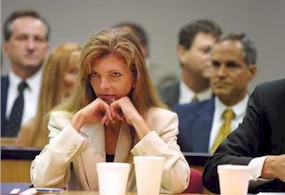 Earnhardt News Earnhardt News
2001 Season
Judge denies Dale Earnhardt photo request
Judge rules in favor of Teresa, photos won't be
released
By Mike Branom / AP
|

Teresa Earnhardt watches during
court proceedings in Daytona Beach, Fla. Teresa testified Tuesday that she has tried to
stop the public release of her husband's autopsy photos to spare her family "painful
emotional distress."
|
|
|
DAYTONA BEACH, Fla.
(June 13, 2001)
A judge refused to release Dale Earnhardt's autopsy photos Wednesday, agreeing with the
NASCAR great's widow that making the pictures public would cause the family pain.
``In this particular case, the release constitutes a
serious invasion of the highest degree. There is no question it's harmful, it's
unspeakable,'' said Circuit Judge Joseph Will.
Will's decision was the latest victory for Teresa Earnhardt
in her four-month battle to keep the autopsy photos out of the public realm.
Mrs. Earnhardt feared the photos would be posted on the
Internet and would humiliate and distress her family.
The Independent Florida Alligator, a student-run newspaper
at the University of Florida, and a DeLand-based Web site had sought access to the autopsy
photos of Earnhardt, who died in a last-lap crash at the Daytona 500.
Their attorneys had argued that a public review of the
photos could prevent more racing deaths and determine if the medical examiner did an
adequate job of determining what killed Earnhardt.
``We want a safer future where a great good has been
served,'' said Tom Julin, an attorney for The Alligator. ``We want more information
because we want to stop these deaths from happening.''
Julin said his client would seek a motion for a new trial.
If that is denied, the case would move to the Fifth District Court of Appeal.
``The upholding of this statute makes it nearly impossible
to get at autopsy photos, even when there's clearly good cause to do that,'' Julin said.
``Most people can't afford to go through this. They can't hire lawyers, they can't battle
the forces that we've seen here to get at that information.''
But Mrs. Earnhardt testified at the three-day hearing that
she has tried to stop the public release of the photos to spare her family ``painful
emotional distress.''
``The photographs are humiliating, disgusting and
negative,'' she said. ``That could be nothing but harmful and painful to anyone involved
with my family, my company, our fans, anyone.''
``I think she was pleased,'' said Earnhardt attorney Thom
Rumberger after the ruling. ``But she understands this is just the start of a long
process. There's no joy in Mudville tonight.''
Under a law passed after Earnhardt's death, a judge must be
convinced of the necessity of unsealing autopsy photos.
On Monday, Will upheld the constitutionality of the law,
which forbids copying or inspecting autopsy photos and records. Breaking the law would be
a third-degree felony with a maximum sentence of five years in prison and a $5,000 fine.
Lawyers for the Earnhardt family had also asked the judge
to make permanent the temporary injunction banning access to the photos.
Will declined to rule on the issue.
``This is not a place for a circuit judge to go,'' he said.
A permanent injunction was opposed by lawyers for the
newspaper and Web site, in addition to the Orlando Sentinel and Volusia County.
``Only the Legislature has the authority to grant an
exemption,'' Volusia County attorney Dan Eckert said. ``Any balance of privacy concerns
have to be done by the Legislature. It's not appropriate for administrative officials to
do so.''
Mrs. Earnhardt filed the lawsuit seeking to block the
release of the photos four days after her husband's death on Feb. 18. NASCAR officials
said a broken seat belt may have contributed to Earnhardt's death, comments that have been
disputed by paramedics at the scene and the seat belt's manufacturer.
The Orlando Sentinel, which had been investigating NASCAR
safety, then challenged the injunction, saying it wanted to review the photos for its
investigation.
Mrs. Earnhardt and the Sentinel reached a settlement that
allowed an independent medical expert to view the photos, issue a report and the photos
would be permanently sealed. The medical expert determined Earnhardt didn't die from
striking his head on a steering wheel because of a malfunctioning seat belt.
David Bralow, an attorney for the Sentinel, declined
comment.
The Alligator and Websitecity asked to intervene in the
case, arguing that they couldn't be forced to be a part of the settlement. The Volusia
County medical examiner's office also said it couldn't enforce the settlement.



T h e E a r n h a r d t C o n n
e c t i o n
Home Page | Contact Us

|


